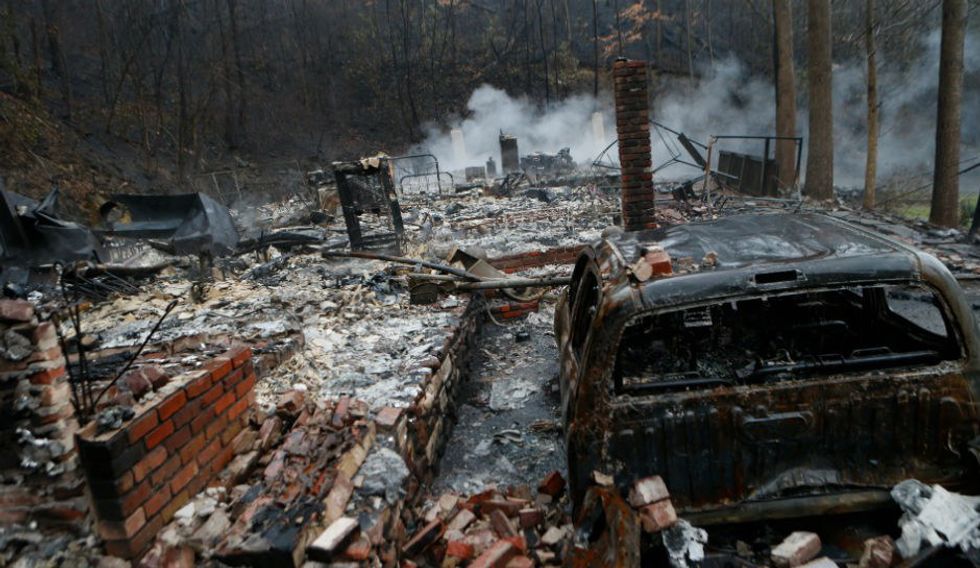Everyone in the southeastern United States has been aware of serious droughts for weeks now. Up until perhaps last week, most hadn’t even seen rain since early September. Plans for water conservation and drought precautions have been at the forefront of university newsletters, city and county officials’ announcements, and mainstream media. But no one was prepared for the inferno that is only beginning to dwindle down in the greater Gatlinburg, Tennessee area.
Gatlinburg and Pigeon Forge, Tennessee, as well as surrounding areas, enjoy the incredible beauty of the Great Smoky Mountains and the Great Smoky Mountain National Park. As a temperate forest, wildfires that become out of control are few and far in between. Occasional lightning strikes are the primary cause for unplanned fires in the area. For the most part, the fires that normally blaze are prescribed by the park’s fire staff in order to reconstitute the forest floor and revitalize species that thrive from fire and its residual affects. These fires are always meticulously planned bringing into consideration: weather, fuel moisture, soil moisture, availability of trained fire-fighting personnel, and air quality conditions. Another primary reason for these planned fires is to reduce the amount of dead wood and brush which, under the right conditions, could produce raging wildfires.
Unfortunately, wildfires are bound to happen. And in the extremely early hours of Monday, November 28, 2016 embers from Chimney Tops Trail blew into residential areas. The Chimney Tops Trail blaze began days earlier and is thought to be the result of a man-made fire, though officials haven’t commented beyond that. The once contained fire spread rapidly as hurricane force winds blew it northward and towards the town of Gatlinburg. These hurricane force winds acted as a second igniter to the wildfire as they downed power lines. Sparks from these power lines easily lit the drought-conditioned area.
Sevier County lost a great deal in the coming days as rain and nearly two hundred firefighters tried to contain the massive inferno. 17,000 acres, most of which were in the Great Smoky Mountain National Park, have been lost to the devastating wildfire. Severe County lost 700 buildings, both residential and commercial, in under 24 hours, 300 of which were in the immediate Gatlinburg area. Little over 100 people are still unaccounted for after 14,000 residents and tourists were evacuated from the fire zone. The death toll has reached 13 as of December 2nd. 12 were in direct correlation with the fire, and 1 was from a heart attack after serious smoke inhalation.
The American Red Cross has asked for a pause in donations of “in-kind” items, i.e. food, water, and clothing. Collection drives from across the region have been held, and the shelters are inundated with supplies. City officials have requested monetary funds and gift cards to the Gatlinburg City of Commerce so they can help families with specific needs. Other ways to donate can be found below.
To all those who call Sevier County home, you have the love and support of an entire nation behind you. We pray for your community as you begin the process of rebuilding your homes, churches, and lives. Never doubt that God is with you in these times of struggle, and that, no matter how dark the day may seem, there is always hope. We’re praying for you.
#prayforgatlinburg
Ways to aid in disaster relief can be found by visiting redcross.org/donate and to make a $10 donation by text, text the word REDCROSS to 90999. To volunteer, particularly after the evacuation and during the wildfire recovery, visit redcross.org/volunteer.
The Community Foundation of Middle Tennessee has also set up a support fund to distribute donations directly to the affected communities and the nonprofits on the ground helping victims and addressing their needs. Donate here: cfmt.org.
The Tennessee Hospitality & Tourism Association and the Greater Nashville Hospitality Association are accepting donations to assist victims. Contact Jessica Cardwell at jessica@tnhta.net or Greg Adkins at greg@tnhta. You can also call 615-385-9970. Checks can be mailed to the Tennessee Hospitality & Tourism Association, 475 Craighead St., Nashville, TN 37204.
Kroger has joined with the East Tennessee Chapter of the American Red Cross to provide financial aid. Donations will be accepted at all Middle and East Tennessee Kroger stores, Northern Alabama Kroger stores, and Southern Kentucky Kroger locations. All money will be forwarded directly to the East Tennessee Chapter of the American Red Cross. The company will also make a $10,000 corporate contribution.






















